Comparison of Psychological Contracts in SMEs: Western vs. Developing
VerifiedAdded on 2020/01/07
|35
|12397
|50
Report
AI Summary
This report provides a detailed comparison of psychological contracts within Small and Medium Enterprises (SMEs) across Western and developing countries, focusing on employee-employer relationships. The study explores the impact of globalization and the importance of treating employees respectfully in the modern business era. The report examines the rationale behind the study, highlighting the challenges faced by SMEs in competitive markets and the significance of psychological contracts in maintaining a standard relationship between employees and employers. The research aims to identify the nature of psychological contracts, perceptions of employees and employers, and issues in comparing them, offering potential solutions to challenges. The methodology includes a descriptive study with an inductive approach, utilizing secondary data sources and a qualitative data analysis method. The report is structured to include an introduction, literature review, research methodology, data analysis, and conclusions with recommendations, providing a comprehensive overview of the subject matter.
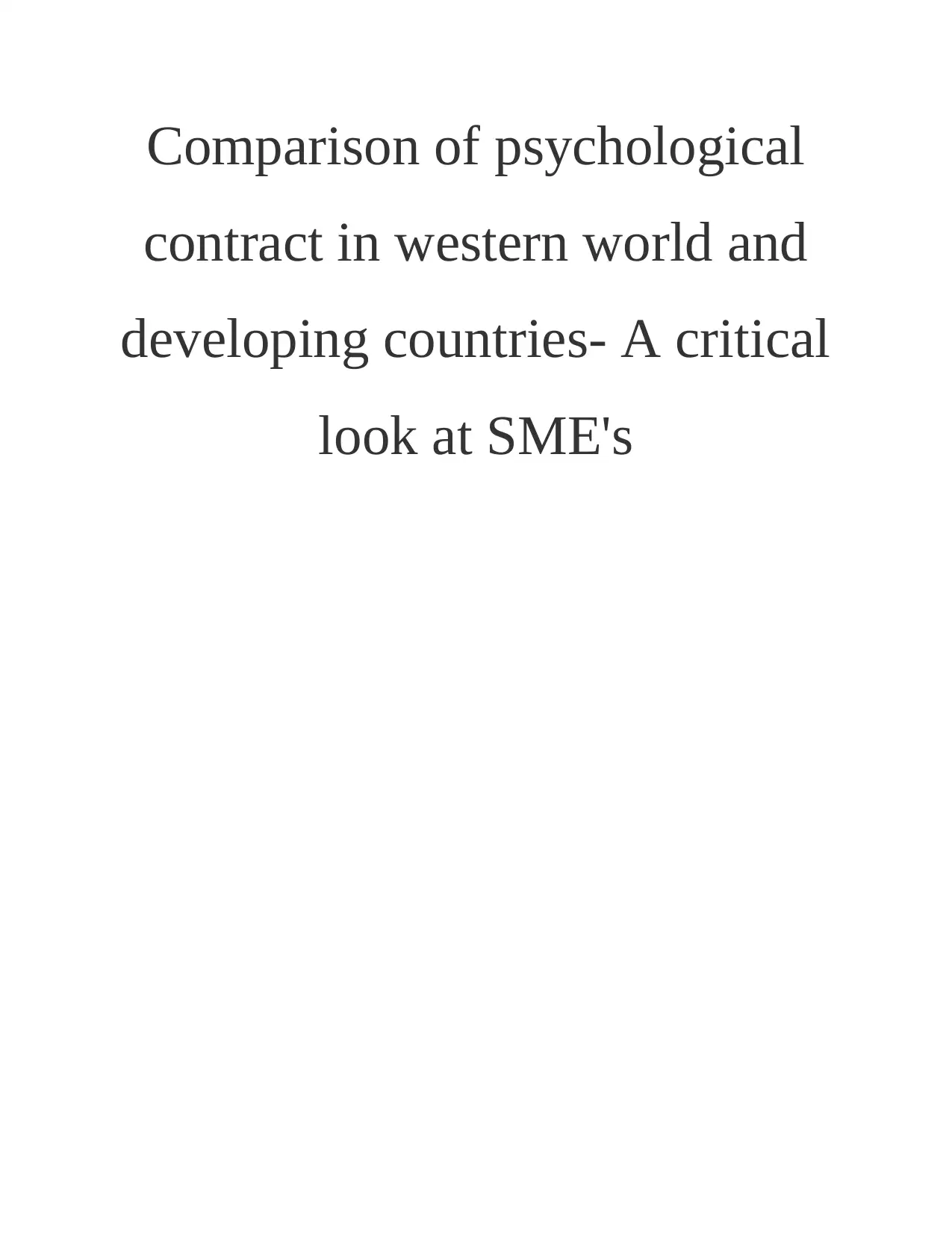
Comparison of psychological
contract in western world and
developing countries- A critical
look at SME's
contract in western world and
developing countries- A critical
look at SME's
Paraphrase This Document
Need a fresh take? Get an instant paraphrase of this document with our AI Paraphraser

EXECUTIVE SUMMARY

1
⊘ This is a preview!⊘
Do you want full access?
Subscribe today to unlock all pages.

Trusted by 1+ million students worldwide
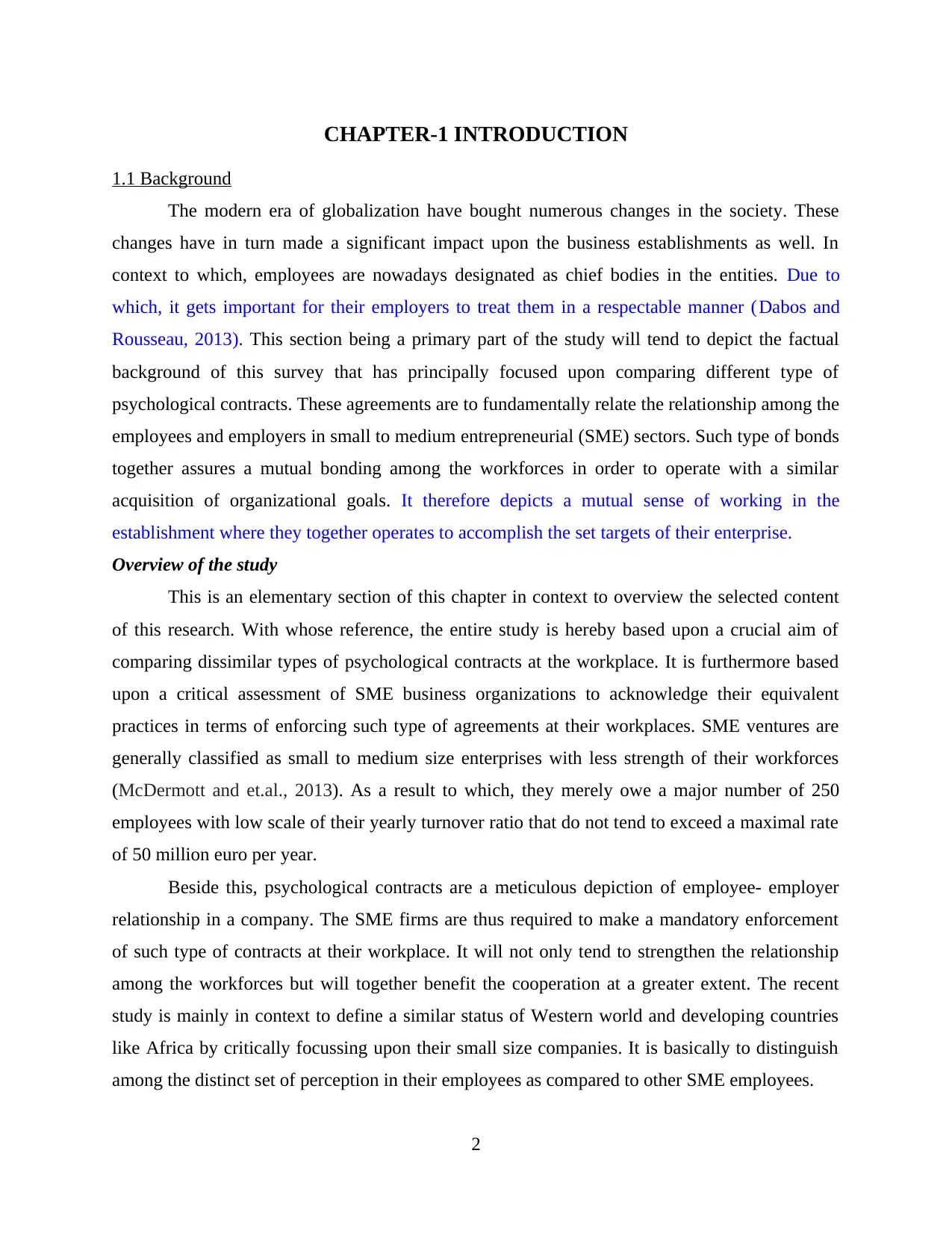
CHAPTER-1 INTRODUCTION
1.1 Background
The modern era of globalization have bought numerous changes in the society. These
changes have in turn made a significant impact upon the business establishments as well. In
context to which, employees are nowadays designated as chief bodies in the entities. Due to
which, it gets important for their employers to treat them in a respectable manner (Dabos and
Rousseau, 2013). This section being a primary part of the study will tend to depict the factual
background of this survey that has principally focused upon comparing different type of
psychological contracts. These agreements are to fundamentally relate the relationship among the
employees and employers in small to medium entrepreneurial (SME) sectors. Such type of bonds
together assures a mutual bonding among the workforces in order to operate with a similar
acquisition of organizational goals. It therefore depicts a mutual sense of working in the
establishment where they together operates to accomplish the set targets of their enterprise.
Overview of the study
This is an elementary section of this chapter in context to overview the selected content
of this research. With whose reference, the entire study is hereby based upon a crucial aim of
comparing dissimilar types of psychological contracts at the workplace. It is furthermore based
upon a critical assessment of SME business organizations to acknowledge their equivalent
practices in terms of enforcing such type of agreements at their workplaces. SME ventures are
generally classified as small to medium size enterprises with less strength of their workforces
(McDermott and et.al., 2013). As a result to which, they merely owe a major number of 250
employees with low scale of their yearly turnover ratio that do not tend to exceed a maximal rate
of 50 million euro per year.
Beside this, psychological contracts are a meticulous depiction of employee- employer
relationship in a company. The SME firms are thus required to make a mandatory enforcement
of such type of contracts at their workplace. It will not only tend to strengthen the relationship
among the workforces but will together benefit the cooperation at a greater extent. The recent
study is mainly in context to define a similar status of Western world and developing countries
like Africa by critically focussing upon their small size companies. It is basically to distinguish
among the distinct set of perception in their employees as compared to other SME employees.
2
1.1 Background
The modern era of globalization have bought numerous changes in the society. These
changes have in turn made a significant impact upon the business establishments as well. In
context to which, employees are nowadays designated as chief bodies in the entities. Due to
which, it gets important for their employers to treat them in a respectable manner (Dabos and
Rousseau, 2013). This section being a primary part of the study will tend to depict the factual
background of this survey that has principally focused upon comparing different type of
psychological contracts. These agreements are to fundamentally relate the relationship among the
employees and employers in small to medium entrepreneurial (SME) sectors. Such type of bonds
together assures a mutual bonding among the workforces in order to operate with a similar
acquisition of organizational goals. It therefore depicts a mutual sense of working in the
establishment where they together operates to accomplish the set targets of their enterprise.
Overview of the study
This is an elementary section of this chapter in context to overview the selected content
of this research. With whose reference, the entire study is hereby based upon a crucial aim of
comparing dissimilar types of psychological contracts at the workplace. It is furthermore based
upon a critical assessment of SME business organizations to acknowledge their equivalent
practices in terms of enforcing such type of agreements at their workplaces. SME ventures are
generally classified as small to medium size enterprises with less strength of their workforces
(McDermott and et.al., 2013). As a result to which, they merely owe a major number of 250
employees with low scale of their yearly turnover ratio that do not tend to exceed a maximal rate
of 50 million euro per year.
Beside this, psychological contracts are a meticulous depiction of employee- employer
relationship in a company. The SME firms are thus required to make a mandatory enforcement
of such type of contracts at their workplace. It will not only tend to strengthen the relationship
among the workforces but will together benefit the cooperation at a greater extent. The recent
study is mainly in context to define a similar status of Western world and developing countries
like Africa by critically focussing upon their small size companies. It is basically to distinguish
among the distinct set of perception in their employees as compared to other SME employees.
2
Paraphrase This Document
Need a fresh take? Get an instant paraphrase of this document with our AI Paraphraser
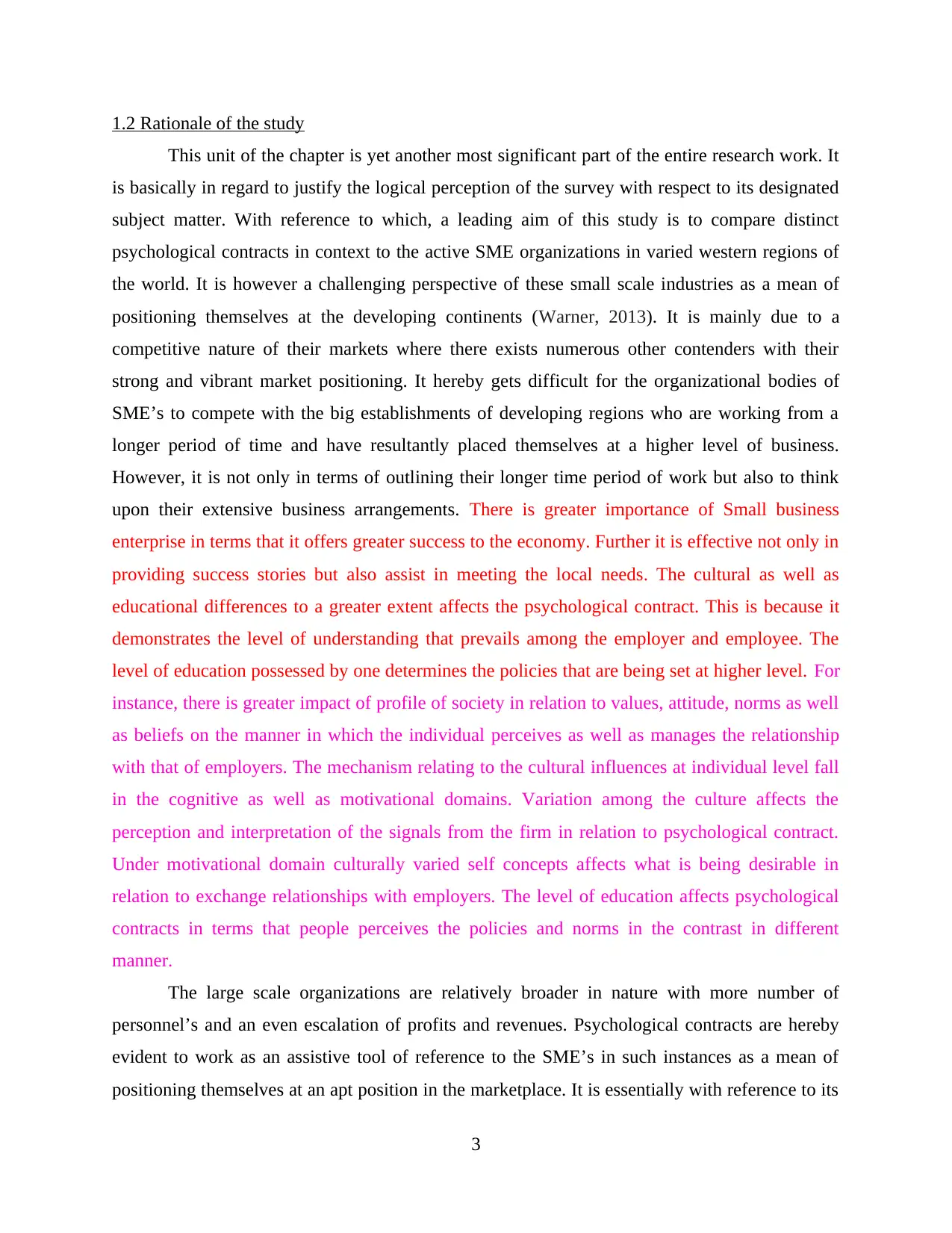
1.2 Rationale of the study
This unit of the chapter is yet another most significant part of the entire research work. It
is basically in regard to justify the logical perception of the survey with respect to its designated
subject matter. With reference to which, a leading aim of this study is to compare distinct
psychological contracts in context to the active SME organizations in varied western regions of
the world. It is however a challenging perspective of these small scale industries as a mean of
positioning themselves at the developing continents (Warner, 2013). It is mainly due to a
competitive nature of their markets where there exists numerous other contenders with their
strong and vibrant market positioning. It hereby gets difficult for the organizational bodies of
SME’s to compete with the big establishments of developing regions who are working from a
longer period of time and have resultantly placed themselves at a higher level of business.
However, it is not only in terms of outlining their longer time period of work but also to think
upon their extensive business arrangements. There is greater importance of Small business
enterprise in terms that it offers greater success to the economy. Further it is effective not only in
providing success stories but also assist in meeting the local needs. The cultural as well as
educational differences to a greater extent affects the psychological contract. This is because it
demonstrates the level of understanding that prevails among the employer and employee. The
level of education possessed by one determines the policies that are being set at higher level. For
instance, there is greater impact of profile of society in relation to values, attitude, norms as well
as beliefs on the manner in which the individual perceives as well as manages the relationship
with that of employers. The mechanism relating to the cultural influences at individual level fall
in the cognitive as well as motivational domains. Variation among the culture affects the
perception and interpretation of the signals from the firm in relation to psychological contract.
Under motivational domain culturally varied self concepts affects what is being desirable in
relation to exchange relationships with employers. The level of education affects psychological
contracts in terms that people perceives the policies and norms in the contrast in different
manner.
The large scale organizations are relatively broader in nature with more number of
personnel’s and an even escalation of profits and revenues. Psychological contracts are hereby
evident to work as an assistive tool of reference to the SME’s in such instances as a mean of
positioning themselves at an apt position in the marketplace. It is essentially with reference to its
3
This unit of the chapter is yet another most significant part of the entire research work. It
is basically in regard to justify the logical perception of the survey with respect to its designated
subject matter. With reference to which, a leading aim of this study is to compare distinct
psychological contracts in context to the active SME organizations in varied western regions of
the world. It is however a challenging perspective of these small scale industries as a mean of
positioning themselves at the developing continents (Warner, 2013). It is mainly due to a
competitive nature of their markets where there exists numerous other contenders with their
strong and vibrant market positioning. It hereby gets difficult for the organizational bodies of
SME’s to compete with the big establishments of developing regions who are working from a
longer period of time and have resultantly placed themselves at a higher level of business.
However, it is not only in terms of outlining their longer time period of work but also to think
upon their extensive business arrangements. There is greater importance of Small business
enterprise in terms that it offers greater success to the economy. Further it is effective not only in
providing success stories but also assist in meeting the local needs. The cultural as well as
educational differences to a greater extent affects the psychological contract. This is because it
demonstrates the level of understanding that prevails among the employer and employee. The
level of education possessed by one determines the policies that are being set at higher level. For
instance, there is greater impact of profile of society in relation to values, attitude, norms as well
as beliefs on the manner in which the individual perceives as well as manages the relationship
with that of employers. The mechanism relating to the cultural influences at individual level fall
in the cognitive as well as motivational domains. Variation among the culture affects the
perception and interpretation of the signals from the firm in relation to psychological contract.
Under motivational domain culturally varied self concepts affects what is being desirable in
relation to exchange relationships with employers. The level of education affects psychological
contracts in terms that people perceives the policies and norms in the contrast in different
manner.
The large scale organizations are relatively broader in nature with more number of
personnel’s and an even escalation of profits and revenues. Psychological contracts are hereby
evident to work as an assistive tool of reference to the SME’s in such instances as a mean of
positioning themselves at an apt position in the marketplace. It is essentially with reference to its
3
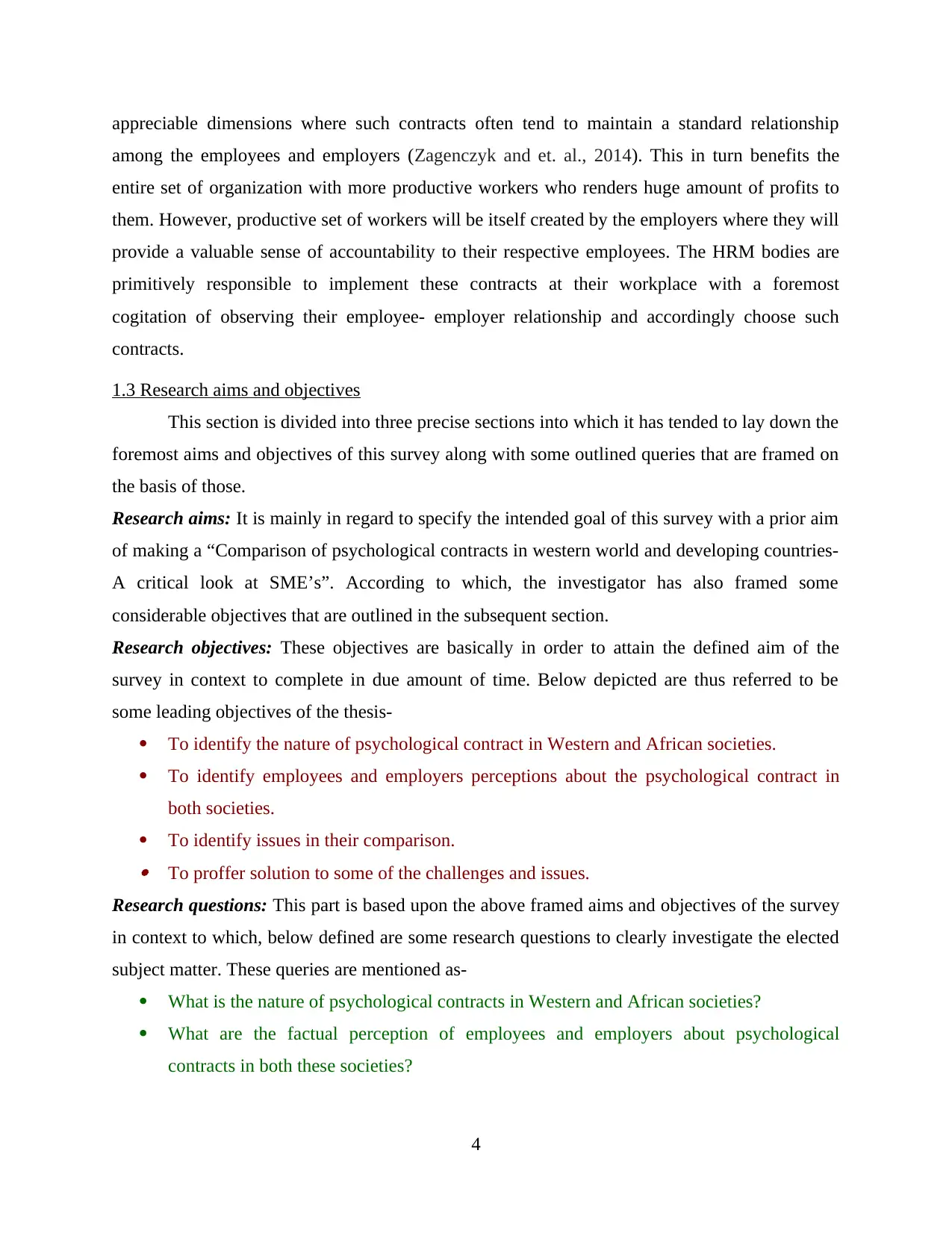
appreciable dimensions where such contracts often tend to maintain a standard relationship
among the employees and employers (Zagenczyk and et. al., 2014). This in turn benefits the
entire set of organization with more productive workers who renders huge amount of profits to
them. However, productive set of workers will be itself created by the employers where they will
provide a valuable sense of accountability to their respective employees. The HRM bodies are
primitively responsible to implement these contracts at their workplace with a foremost
cogitation of observing their employee- employer relationship and accordingly choose such
contracts.
1.3 Research aims and objectives
This section is divided into three precise sections into which it has tended to lay down the
foremost aims and objectives of this survey along with some outlined queries that are framed on
the basis of those.
Research aims: It is mainly in regard to specify the intended goal of this survey with a prior aim
of making a “Comparison of psychological contracts in western world and developing countries-
A critical look at SME’s”. According to which, the investigator has also framed some
considerable objectives that are outlined in the subsequent section.
Research objectives: These objectives are basically in order to attain the defined aim of the
survey in context to complete in due amount of time. Below depicted are thus referred to be
some leading objectives of the thesis-
To identify the nature of psychological contract in Western and African societies.
To identify employees and employers perceptions about the psychological contract in
both societies.
To identify issues in their comparison. To proffer solution to some of the challenges and issues.
Research questions: This part is based upon the above framed aims and objectives of the survey
in context to which, below defined are some research questions to clearly investigate the elected
subject matter. These queries are mentioned as-
What is the nature of psychological contracts in Western and African societies?
What are the factual perception of employees and employers about psychological
contracts in both these societies?
4
among the employees and employers (Zagenczyk and et. al., 2014). This in turn benefits the
entire set of organization with more productive workers who renders huge amount of profits to
them. However, productive set of workers will be itself created by the employers where they will
provide a valuable sense of accountability to their respective employees. The HRM bodies are
primitively responsible to implement these contracts at their workplace with a foremost
cogitation of observing their employee- employer relationship and accordingly choose such
contracts.
1.3 Research aims and objectives
This section is divided into three precise sections into which it has tended to lay down the
foremost aims and objectives of this survey along with some outlined queries that are framed on
the basis of those.
Research aims: It is mainly in regard to specify the intended goal of this survey with a prior aim
of making a “Comparison of psychological contracts in western world and developing countries-
A critical look at SME’s”. According to which, the investigator has also framed some
considerable objectives that are outlined in the subsequent section.
Research objectives: These objectives are basically in order to attain the defined aim of the
survey in context to complete in due amount of time. Below depicted are thus referred to be
some leading objectives of the thesis-
To identify the nature of psychological contract in Western and African societies.
To identify employees and employers perceptions about the psychological contract in
both societies.
To identify issues in their comparison. To proffer solution to some of the challenges and issues.
Research questions: This part is based upon the above framed aims and objectives of the survey
in context to which, below defined are some research questions to clearly investigate the elected
subject matter. These queries are mentioned as-
What is the nature of psychological contracts in Western and African societies?
What are the factual perception of employees and employers about psychological
contracts in both these societies?
4
⊘ This is a preview!⊘
Do you want full access?
Subscribe today to unlock all pages.

Trusted by 1+ million students worldwide
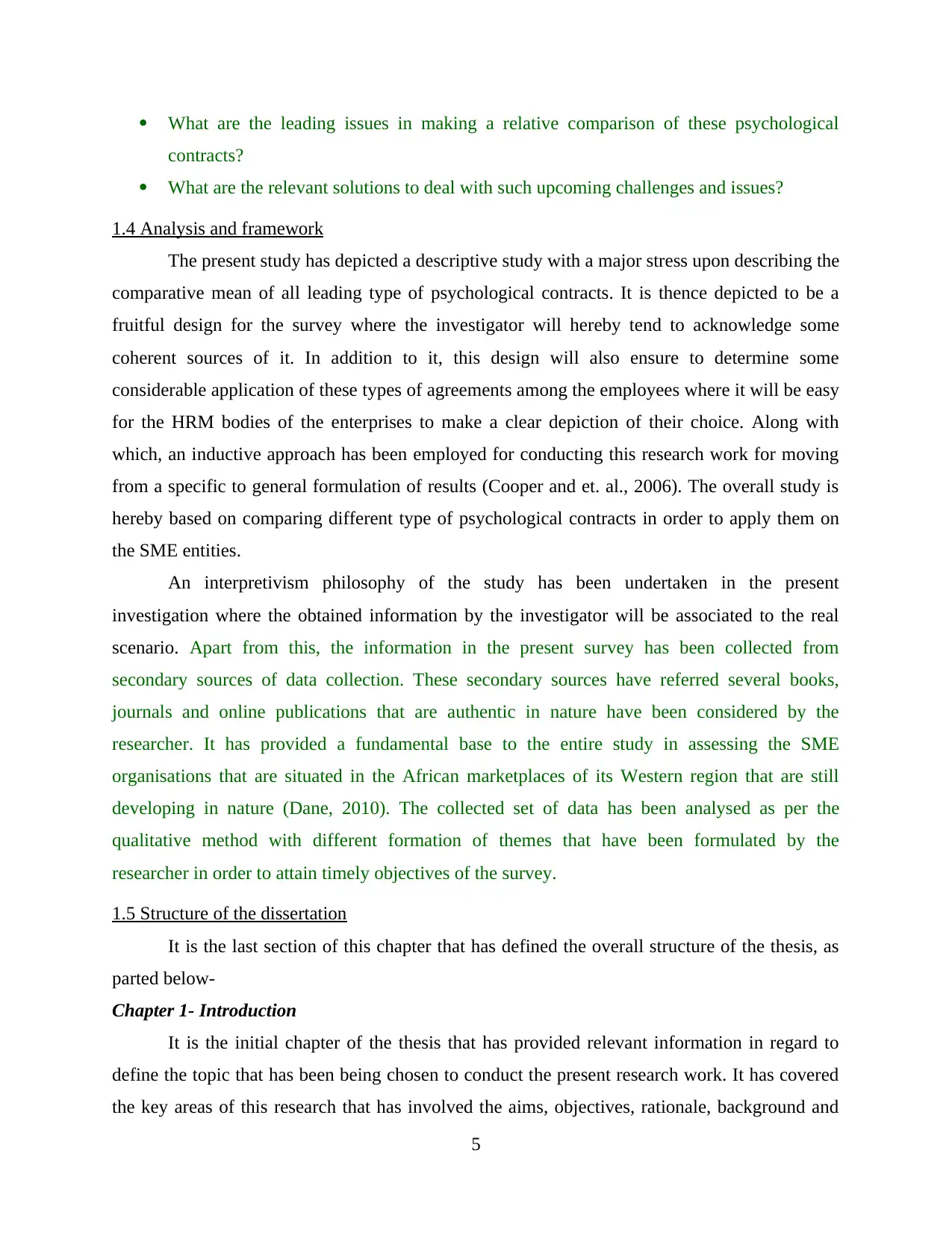
What are the leading issues in making a relative comparison of these psychological
contracts?
What are the relevant solutions to deal with such upcoming challenges and issues?
1.4 Analysis and framework
The present study has depicted a descriptive study with a major stress upon describing the
comparative mean of all leading type of psychological contracts. It is thence depicted to be a
fruitful design for the survey where the investigator will hereby tend to acknowledge some
coherent sources of it. In addition to it, this design will also ensure to determine some
considerable application of these types of agreements among the employees where it will be easy
for the HRM bodies of the enterprises to make a clear depiction of their choice. Along with
which, an inductive approach has been employed for conducting this research work for moving
from a specific to general formulation of results (Cooper and et. al., 2006). The overall study is
hereby based on comparing different type of psychological contracts in order to apply them on
the SME entities.
An interpretivism philosophy of the study has been undertaken in the present
investigation where the obtained information by the investigator will be associated to the real
scenario. Apart from this, the information in the present survey has been collected from
secondary sources of data collection. These secondary sources have referred several books,
journals and online publications that are authentic in nature have been considered by the
researcher. It has provided a fundamental base to the entire study in assessing the SME
organisations that are situated in the African marketplaces of its Western region that are still
developing in nature (Dane, 2010). The collected set of data has been analysed as per the
qualitative method with different formation of themes that have been formulated by the
researcher in order to attain timely objectives of the survey.
1.5 Structure of the dissertation
It is the last section of this chapter that has defined the overall structure of the thesis, as
parted below-
Chapter 1- Introduction
It is the initial chapter of the thesis that has provided relevant information in regard to
define the topic that has been being chosen to conduct the present research work. It has covered
the key areas of this research that has involved the aims, objectives, rationale, background and
5
contracts?
What are the relevant solutions to deal with such upcoming challenges and issues?
1.4 Analysis and framework
The present study has depicted a descriptive study with a major stress upon describing the
comparative mean of all leading type of psychological contracts. It is thence depicted to be a
fruitful design for the survey where the investigator will hereby tend to acknowledge some
coherent sources of it. In addition to it, this design will also ensure to determine some
considerable application of these types of agreements among the employees where it will be easy
for the HRM bodies of the enterprises to make a clear depiction of their choice. Along with
which, an inductive approach has been employed for conducting this research work for moving
from a specific to general formulation of results (Cooper and et. al., 2006). The overall study is
hereby based on comparing different type of psychological contracts in order to apply them on
the SME entities.
An interpretivism philosophy of the study has been undertaken in the present
investigation where the obtained information by the investigator will be associated to the real
scenario. Apart from this, the information in the present survey has been collected from
secondary sources of data collection. These secondary sources have referred several books,
journals and online publications that are authentic in nature have been considered by the
researcher. It has provided a fundamental base to the entire study in assessing the SME
organisations that are situated in the African marketplaces of its Western region that are still
developing in nature (Dane, 2010). The collected set of data has been analysed as per the
qualitative method with different formation of themes that have been formulated by the
researcher in order to attain timely objectives of the survey.
1.5 Structure of the dissertation
It is the last section of this chapter that has defined the overall structure of the thesis, as
parted below-
Chapter 1- Introduction
It is the initial chapter of the thesis that has provided relevant information in regard to
define the topic that has been being chosen to conduct the present research work. It has covered
the key areas of this research that has involved the aims, objectives, rationale, background and
5
Paraphrase This Document
Need a fresh take? Get an instant paraphrase of this document with our AI Paraphraser
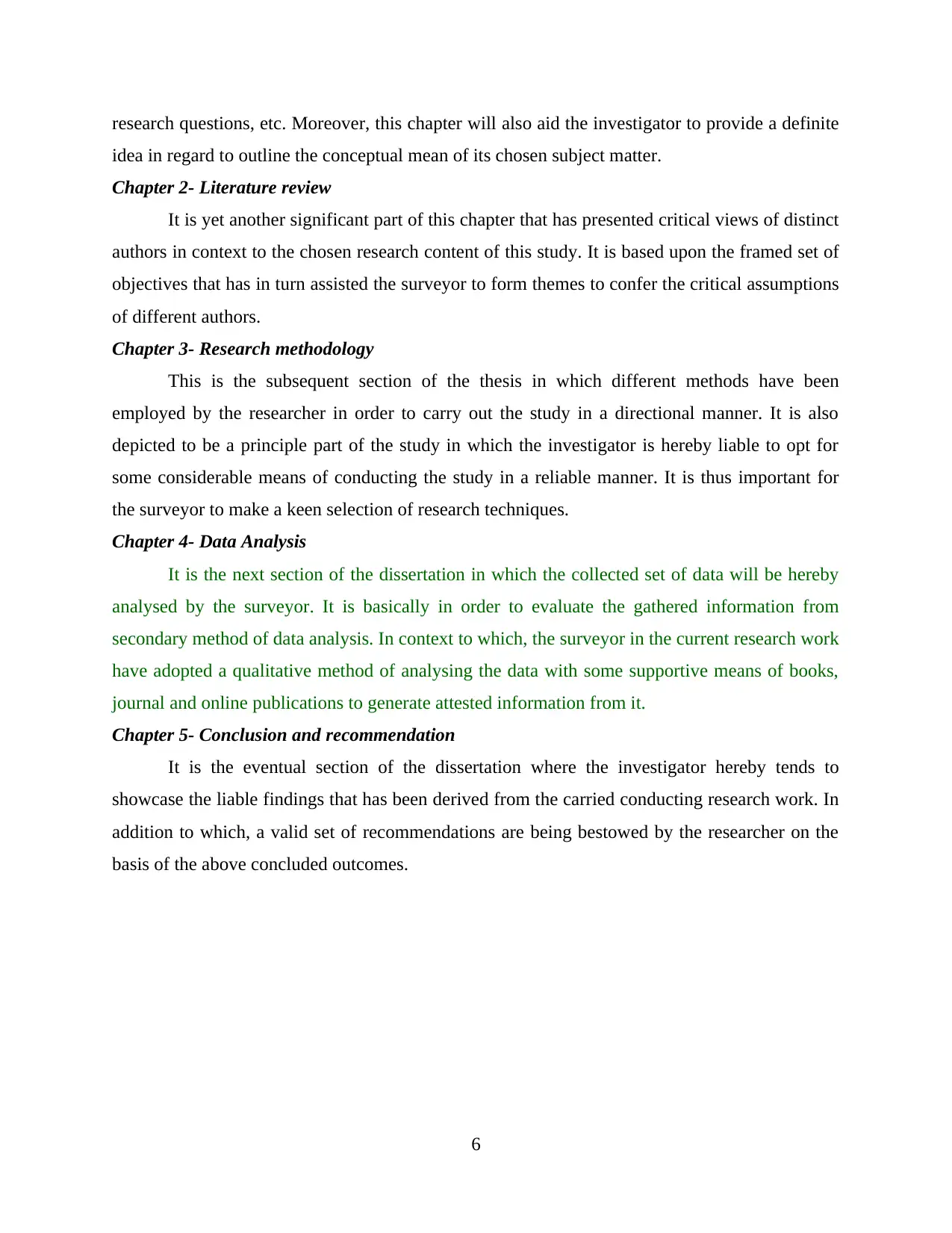
research questions, etc. Moreover, this chapter will also aid the investigator to provide a definite
idea in regard to outline the conceptual mean of its chosen subject matter.
Chapter 2- Literature review
It is yet another significant part of this chapter that has presented critical views of distinct
authors in context to the chosen research content of this study. It is based upon the framed set of
objectives that has in turn assisted the surveyor to form themes to confer the critical assumptions
of different authors.
Chapter 3- Research methodology
This is the subsequent section of the thesis in which different methods have been
employed by the researcher in order to carry out the study in a directional manner. It is also
depicted to be a principle part of the study in which the investigator is hereby liable to opt for
some considerable means of conducting the study in a reliable manner. It is thus important for
the surveyor to make a keen selection of research techniques.
Chapter 4- Data Analysis
It is the next section of the dissertation in which the collected set of data will be hereby
analysed by the surveyor. It is basically in order to evaluate the gathered information from
secondary method of data analysis. In context to which, the surveyor in the current research work
have adopted a qualitative method of analysing the data with some supportive means of books,
journal and online publications to generate attested information from it.
Chapter 5- Conclusion and recommendation
It is the eventual section of the dissertation where the investigator hereby tends to
showcase the liable findings that has been derived from the carried conducting research work. In
addition to which, a valid set of recommendations are being bestowed by the researcher on the
basis of the above concluded outcomes.
6
idea in regard to outline the conceptual mean of its chosen subject matter.
Chapter 2- Literature review
It is yet another significant part of this chapter that has presented critical views of distinct
authors in context to the chosen research content of this study. It is based upon the framed set of
objectives that has in turn assisted the surveyor to form themes to confer the critical assumptions
of different authors.
Chapter 3- Research methodology
This is the subsequent section of the thesis in which different methods have been
employed by the researcher in order to carry out the study in a directional manner. It is also
depicted to be a principle part of the study in which the investigator is hereby liable to opt for
some considerable means of conducting the study in a reliable manner. It is thus important for
the surveyor to make a keen selection of research techniques.
Chapter 4- Data Analysis
It is the next section of the dissertation in which the collected set of data will be hereby
analysed by the surveyor. It is basically in order to evaluate the gathered information from
secondary method of data analysis. In context to which, the surveyor in the current research work
have adopted a qualitative method of analysing the data with some supportive means of books,
journal and online publications to generate attested information from it.
Chapter 5- Conclusion and recommendation
It is the eventual section of the dissertation where the investigator hereby tends to
showcase the liable findings that has been derived from the carried conducting research work. In
addition to which, a valid set of recommendations are being bestowed by the researcher on the
basis of the above concluded outcomes.
6
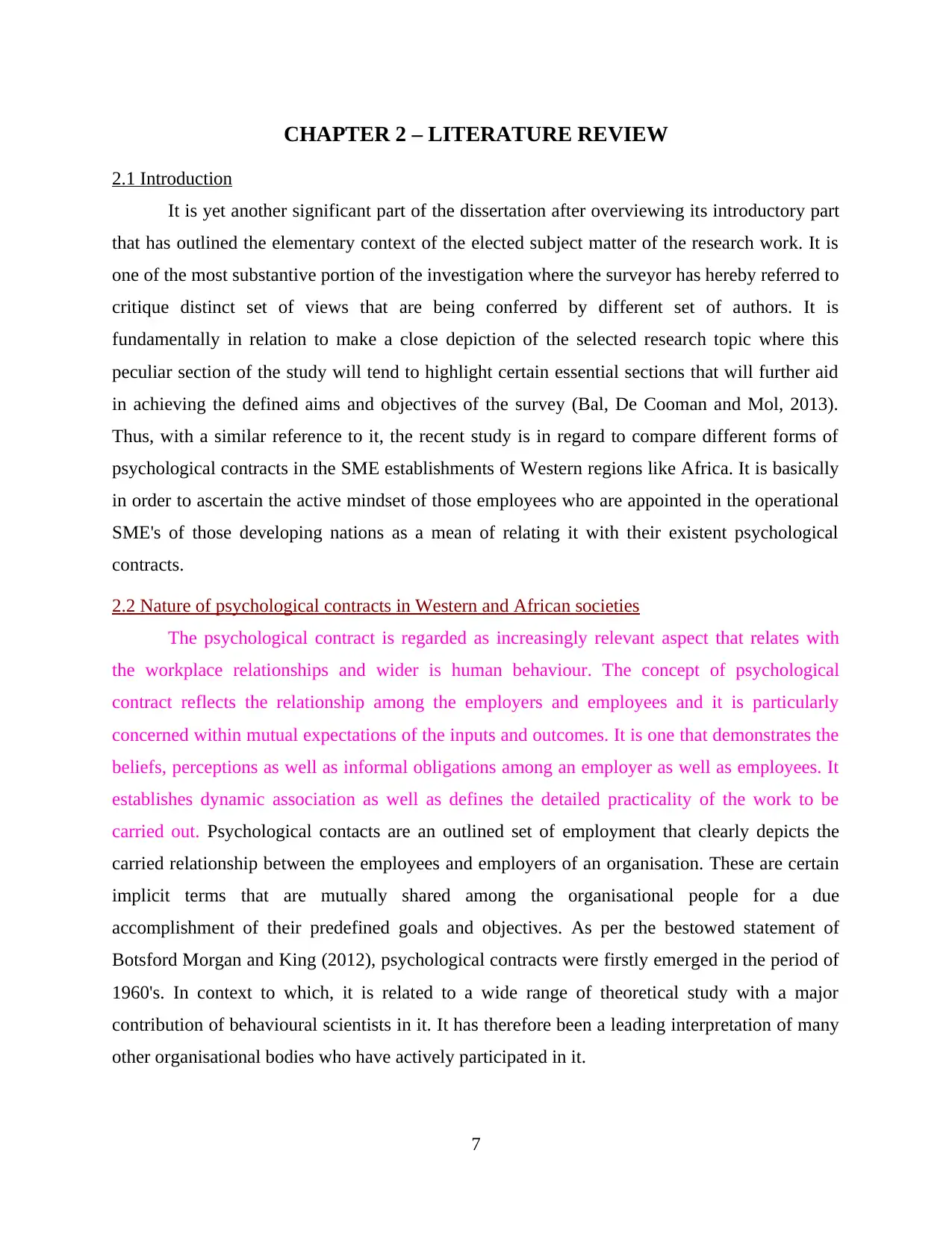
CHAPTER 2 – LITERATURE REVIEW
2.1 Introduction
It is yet another significant part of the dissertation after overviewing its introductory part
that has outlined the elementary context of the elected subject matter of the research work. It is
one of the most substantive portion of the investigation where the surveyor has hereby referred to
critique distinct set of views that are being conferred by different set of authors. It is
fundamentally in relation to make a close depiction of the selected research topic where this
peculiar section of the study will tend to highlight certain essential sections that will further aid
in achieving the defined aims and objectives of the survey (Bal, De Cooman and Mol, 2013).
Thus, with a similar reference to it, the recent study is in regard to compare different forms of
psychological contracts in the SME establishments of Western regions like Africa. It is basically
in order to ascertain the active mindset of those employees who are appointed in the operational
SME's of those developing nations as a mean of relating it with their existent psychological
contracts.
2.2 Nature of psychological contracts in Western and African societies
The psychological contract is regarded as increasingly relevant aspect that relates with
the workplace relationships and wider is human behaviour. The concept of psychological
contract reflects the relationship among the employers and employees and it is particularly
concerned within mutual expectations of the inputs and outcomes. It is one that demonstrates the
beliefs, perceptions as well as informal obligations among an employer as well as employees. It
establishes dynamic association as well as defines the detailed practicality of the work to be
carried out. Psychological contacts are an outlined set of employment that clearly depicts the
carried relationship between the employees and employers of an organisation. These are certain
implicit terms that are mutually shared among the organisational people for a due
accomplishment of their predefined goals and objectives. As per the bestowed statement of
Botsford Morgan and King (2012), psychological contracts were firstly emerged in the period of
1960's. In context to which, it is related to a wide range of theoretical study with a major
contribution of behavioural scientists in it. It has therefore been a leading interpretation of many
other organisational bodies who have actively participated in it.
7
2.1 Introduction
It is yet another significant part of the dissertation after overviewing its introductory part
that has outlined the elementary context of the elected subject matter of the research work. It is
one of the most substantive portion of the investigation where the surveyor has hereby referred to
critique distinct set of views that are being conferred by different set of authors. It is
fundamentally in relation to make a close depiction of the selected research topic where this
peculiar section of the study will tend to highlight certain essential sections that will further aid
in achieving the defined aims and objectives of the survey (Bal, De Cooman and Mol, 2013).
Thus, with a similar reference to it, the recent study is in regard to compare different forms of
psychological contracts in the SME establishments of Western regions like Africa. It is basically
in order to ascertain the active mindset of those employees who are appointed in the operational
SME's of those developing nations as a mean of relating it with their existent psychological
contracts.
2.2 Nature of psychological contracts in Western and African societies
The psychological contract is regarded as increasingly relevant aspect that relates with
the workplace relationships and wider is human behaviour. The concept of psychological
contract reflects the relationship among the employers and employees and it is particularly
concerned within mutual expectations of the inputs and outcomes. It is one that demonstrates the
beliefs, perceptions as well as informal obligations among an employer as well as employees. It
establishes dynamic association as well as defines the detailed practicality of the work to be
carried out. Psychological contacts are an outlined set of employment that clearly depicts the
carried relationship between the employees and employers of an organisation. These are certain
implicit terms that are mutually shared among the organisational people for a due
accomplishment of their predefined goals and objectives. As per the bestowed statement of
Botsford Morgan and King (2012), psychological contracts were firstly emerged in the period of
1960's. In context to which, it is related to a wide range of theoretical study with a major
contribution of behavioural scientists in it. It has therefore been a leading interpretation of many
other organisational bodies who have actively participated in it.
7
⊘ This is a preview!⊘
Do you want full access?
Subscribe today to unlock all pages.

Trusted by 1+ million students worldwide
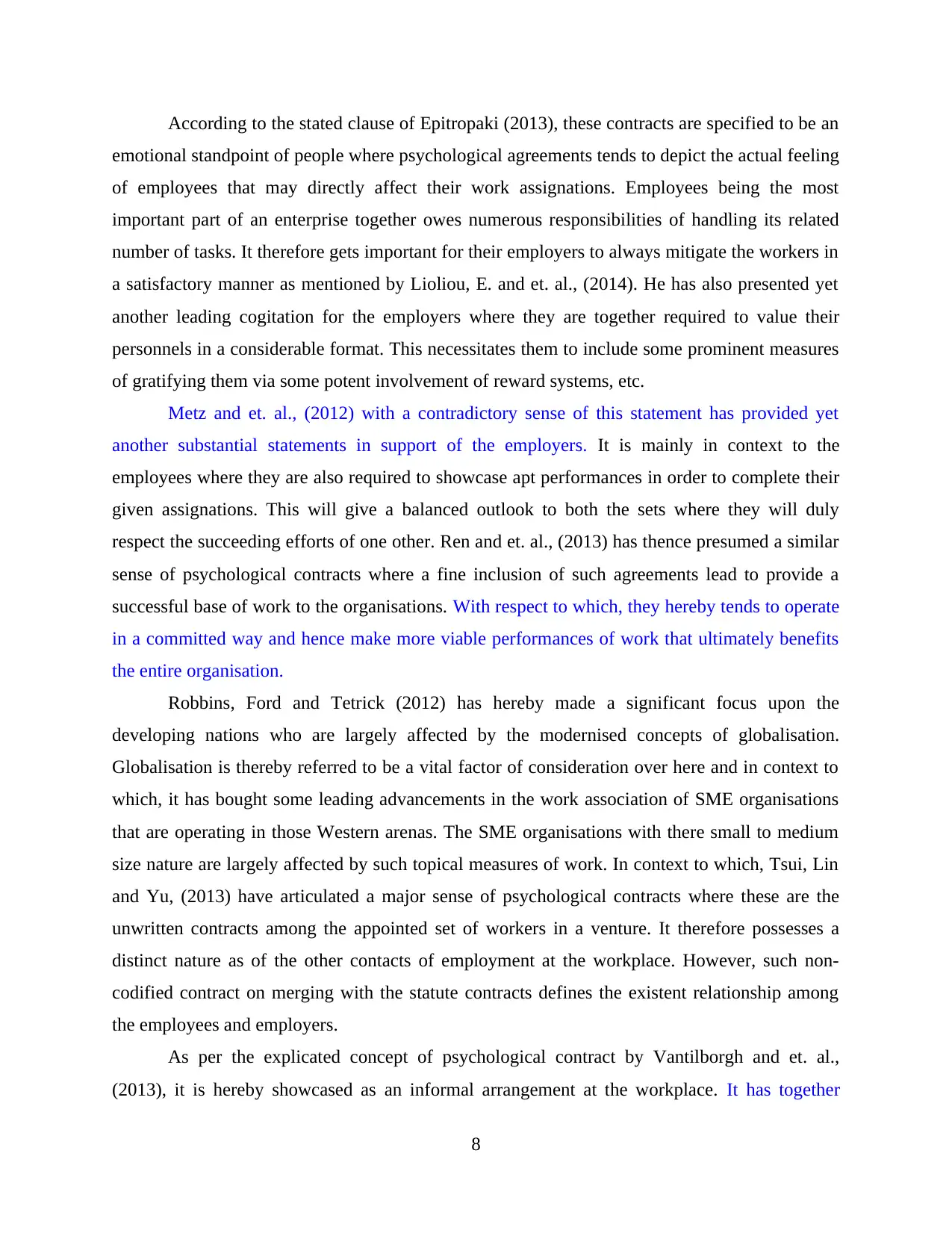
According to the stated clause of Epitropaki (2013), these contracts are specified to be an
emotional standpoint of people where psychological agreements tends to depict the actual feeling
of employees that may directly affect their work assignations. Employees being the most
important part of an enterprise together owes numerous responsibilities of handling its related
number of tasks. It therefore gets important for their employers to always mitigate the workers in
a satisfactory manner as mentioned by Lioliou, E. and et. al., (2014). He has also presented yet
another leading cogitation for the employers where they are together required to value their
personnels in a considerable format. This necessitates them to include some prominent measures
of gratifying them via some potent involvement of reward systems, etc.
Metz and et. al., (2012) with a contradictory sense of this statement has provided yet
another substantial statements in support of the employers. It is mainly in context to the
employees where they are also required to showcase apt performances in order to complete their
given assignations. This will give a balanced outlook to both the sets where they will duly
respect the succeeding efforts of one other. Ren and et. al., (2013) has thence presumed a similar
sense of psychological contracts where a fine inclusion of such agreements lead to provide a
successful base of work to the organisations. With respect to which, they hereby tends to operate
in a committed way and hence make more viable performances of work that ultimately benefits
the entire organisation.
Robbins, Ford and Tetrick (2012) has hereby made a significant focus upon the
developing nations who are largely affected by the modernised concepts of globalisation.
Globalisation is thereby referred to be a vital factor of consideration over here and in context to
which, it has bought some leading advancements in the work association of SME organisations
that are operating in those Western arenas. The SME organisations with there small to medium
size nature are largely affected by such topical measures of work. In context to which, Tsui, Lin
and Yu, (2013) have articulated a major sense of psychological contracts where these are the
unwritten contracts among the appointed set of workers in a venture. It therefore possesses a
distinct nature as of the other contacts of employment at the workplace. However, such non-
codified contract on merging with the statute contracts defines the existent relationship among
the employees and employers.
As per the explicated concept of psychological contract by Vantilborgh and et. al.,
(2013), it is hereby showcased as an informal arrangement at the workplace. It has together
8
emotional standpoint of people where psychological agreements tends to depict the actual feeling
of employees that may directly affect their work assignations. Employees being the most
important part of an enterprise together owes numerous responsibilities of handling its related
number of tasks. It therefore gets important for their employers to always mitigate the workers in
a satisfactory manner as mentioned by Lioliou, E. and et. al., (2014). He has also presented yet
another leading cogitation for the employers where they are together required to value their
personnels in a considerable format. This necessitates them to include some prominent measures
of gratifying them via some potent involvement of reward systems, etc.
Metz and et. al., (2012) with a contradictory sense of this statement has provided yet
another substantial statements in support of the employers. It is mainly in context to the
employees where they are also required to showcase apt performances in order to complete their
given assignations. This will give a balanced outlook to both the sets where they will duly
respect the succeeding efforts of one other. Ren and et. al., (2013) has thence presumed a similar
sense of psychological contracts where a fine inclusion of such agreements lead to provide a
successful base of work to the organisations. With respect to which, they hereby tends to operate
in a committed way and hence make more viable performances of work that ultimately benefits
the entire organisation.
Robbins, Ford and Tetrick (2012) has hereby made a significant focus upon the
developing nations who are largely affected by the modernised concepts of globalisation.
Globalisation is thereby referred to be a vital factor of consideration over here and in context to
which, it has bought some leading advancements in the work association of SME organisations
that are operating in those Western arenas. The SME organisations with there small to medium
size nature are largely affected by such topical measures of work. In context to which, Tsui, Lin
and Yu, (2013) have articulated a major sense of psychological contracts where these are the
unwritten contracts among the appointed set of workers in a venture. It therefore possesses a
distinct nature as of the other contacts of employment at the workplace. However, such non-
codified contract on merging with the statute contracts defines the existent relationship among
the employees and employers.
As per the explicated concept of psychological contract by Vantilborgh and et. al.,
(2013), it is hereby showcased as an informal arrangement at the workplace. It has together
8
Paraphrase This Document
Need a fresh take? Get an instant paraphrase of this document with our AI Paraphraser
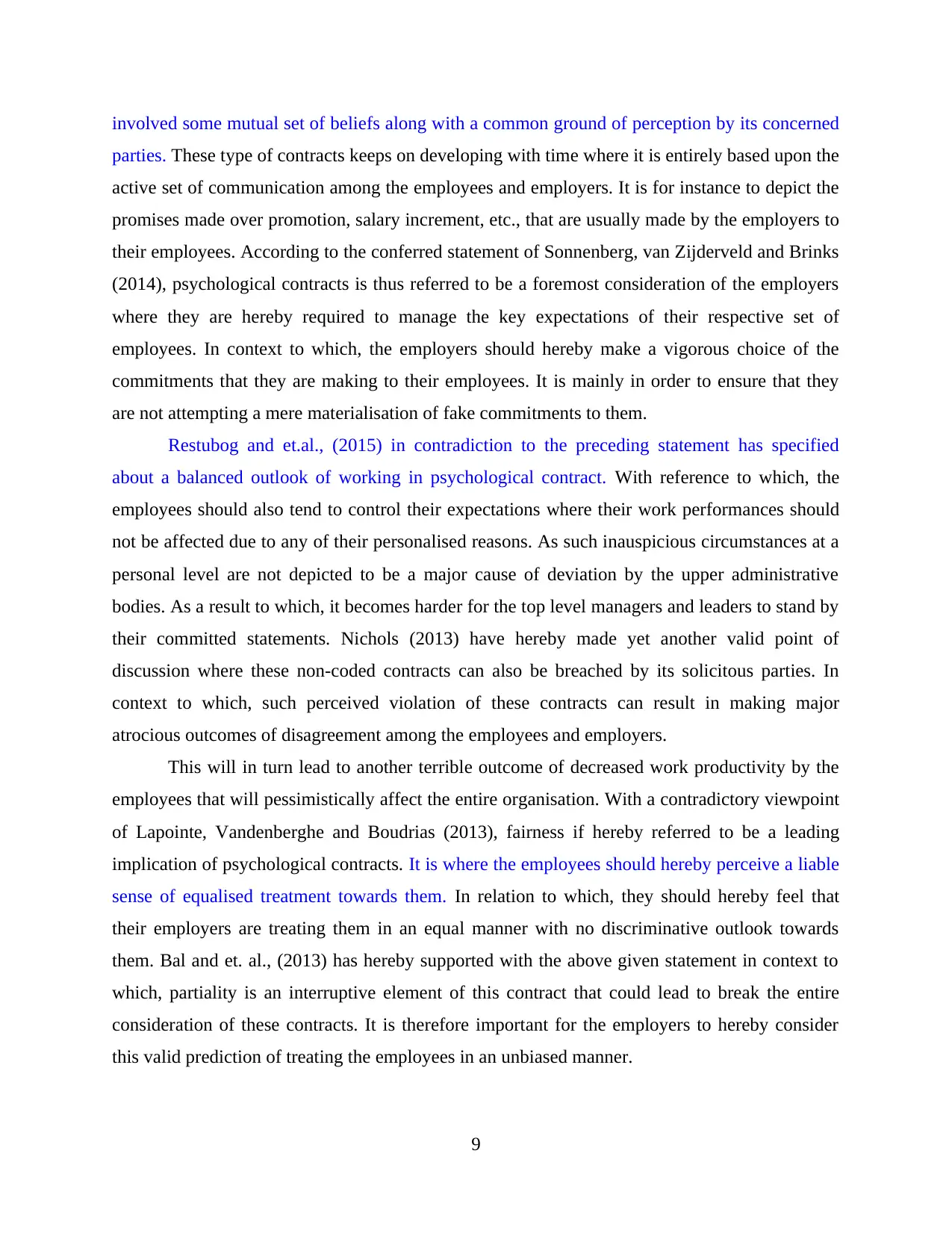
involved some mutual set of beliefs along with a common ground of perception by its concerned
parties. These type of contracts keeps on developing with time where it is entirely based upon the
active set of communication among the employees and employers. It is for instance to depict the
promises made over promotion, salary increment, etc., that are usually made by the employers to
their employees. According to the conferred statement of Sonnenberg, van Zijderveld and Brinks
(2014), psychological contracts is thus referred to be a foremost consideration of the employers
where they are hereby required to manage the key expectations of their respective set of
employees. In context to which, the employers should hereby make a vigorous choice of the
commitments that they are making to their employees. It is mainly in order to ensure that they
are not attempting a mere materialisation of fake commitments to them.
Restubog and et.al., (2015) in contradiction to the preceding statement has specified
about a balanced outlook of working in psychological contract. With reference to which, the
employees should also tend to control their expectations where their work performances should
not be affected due to any of their personalised reasons. As such inauspicious circumstances at a
personal level are not depicted to be a major cause of deviation by the upper administrative
bodies. As a result to which, it becomes harder for the top level managers and leaders to stand by
their committed statements. Nichols (2013) have hereby made yet another valid point of
discussion where these non-coded contracts can also be breached by its solicitous parties. In
context to which, such perceived violation of these contracts can result in making major
atrocious outcomes of disagreement among the employees and employers.
This will in turn lead to another terrible outcome of decreased work productivity by the
employees that will pessimistically affect the entire organisation. With a contradictory viewpoint
of Lapointe, Vandenberghe and Boudrias (2013), fairness if hereby referred to be a leading
implication of psychological contracts. It is where the employees should hereby perceive a liable
sense of equalised treatment towards them. In relation to which, they should hereby feel that
their employers are treating them in an equal manner with no discriminative outlook towards
them. Bal and et. al., (2013) has hereby supported with the above given statement in context to
which, partiality is an interruptive element of this contract that could lead to break the entire
consideration of these contracts. It is therefore important for the employers to hereby consider
this valid prediction of treating the employees in an unbiased manner.
9
parties. These type of contracts keeps on developing with time where it is entirely based upon the
active set of communication among the employees and employers. It is for instance to depict the
promises made over promotion, salary increment, etc., that are usually made by the employers to
their employees. According to the conferred statement of Sonnenberg, van Zijderveld and Brinks
(2014), psychological contracts is thus referred to be a foremost consideration of the employers
where they are hereby required to manage the key expectations of their respective set of
employees. In context to which, the employers should hereby make a vigorous choice of the
commitments that they are making to their employees. It is mainly in order to ensure that they
are not attempting a mere materialisation of fake commitments to them.
Restubog and et.al., (2015) in contradiction to the preceding statement has specified
about a balanced outlook of working in psychological contract. With reference to which, the
employees should also tend to control their expectations where their work performances should
not be affected due to any of their personalised reasons. As such inauspicious circumstances at a
personal level are not depicted to be a major cause of deviation by the upper administrative
bodies. As a result to which, it becomes harder for the top level managers and leaders to stand by
their committed statements. Nichols (2013) have hereby made yet another valid point of
discussion where these non-coded contracts can also be breached by its solicitous parties. In
context to which, such perceived violation of these contracts can result in making major
atrocious outcomes of disagreement among the employees and employers.
This will in turn lead to another terrible outcome of decreased work productivity by the
employees that will pessimistically affect the entire organisation. With a contradictory viewpoint
of Lapointe, Vandenberghe and Boudrias (2013), fairness if hereby referred to be a leading
implication of psychological contracts. It is where the employees should hereby perceive a liable
sense of equalised treatment towards them. In relation to which, they should hereby feel that
their employers are treating them in an equal manner with no discriminative outlook towards
them. Bal and et. al., (2013) has hereby supported with the above given statement in context to
which, partiality is an interruptive element of this contract that could lead to break the entire
consideration of these contracts. It is therefore important for the employers to hereby consider
this valid prediction of treating the employees in an unbiased manner.
9
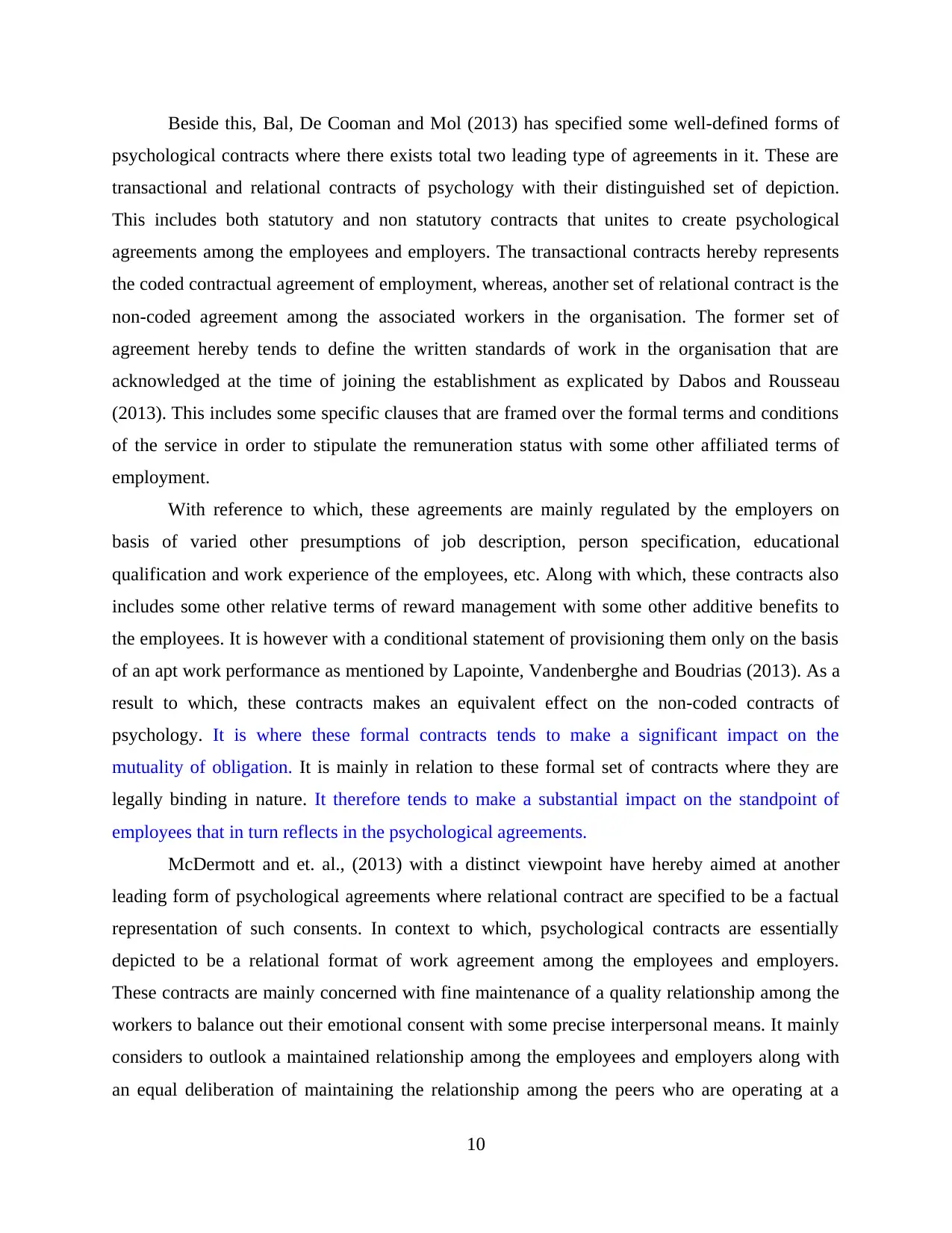
Beside this, Bal, De Cooman and Mol (2013) has specified some well-defined forms of
psychological contracts where there exists total two leading type of agreements in it. These are
transactional and relational contracts of psychology with their distinguished set of depiction.
This includes both statutory and non statutory contracts that unites to create psychological
agreements among the employees and employers. The transactional contracts hereby represents
the coded contractual agreement of employment, whereas, another set of relational contract is the
non-coded agreement among the associated workers in the organisation. The former set of
agreement hereby tends to define the written standards of work in the organisation that are
acknowledged at the time of joining the establishment as explicated by Dabos and Rousseau
(2013). This includes some specific clauses that are framed over the formal terms and conditions
of the service in order to stipulate the remuneration status with some other affiliated terms of
employment.
With reference to which, these agreements are mainly regulated by the employers on
basis of varied other presumptions of job description, person specification, educational
qualification and work experience of the employees, etc. Along with which, these contracts also
includes some other relative terms of reward management with some other additive benefits to
the employees. It is however with a conditional statement of provisioning them only on the basis
of an apt work performance as mentioned by Lapointe, Vandenberghe and Boudrias (2013). As a
result to which, these contracts makes an equivalent effect on the non-coded contracts of
psychology. It is where these formal contracts tends to make a significant impact on the
mutuality of obligation. It is mainly in relation to these formal set of contracts where they are
legally binding in nature. It therefore tends to make a substantial impact on the standpoint of
employees that in turn reflects in the psychological agreements.
McDermott and et. al., (2013) with a distinct viewpoint have hereby aimed at another
leading form of psychological agreements where relational contract are specified to be a factual
representation of such consents. In context to which, psychological contracts are essentially
depicted to be a relational format of work agreement among the employees and employers.
These contracts are mainly concerned with fine maintenance of a quality relationship among the
workers to balance out their emotional consent with some precise interpersonal means. It mainly
considers to outlook a maintained relationship among the employees and employers along with
an equal deliberation of maintaining the relationship among the peers who are operating at a
10
psychological contracts where there exists total two leading type of agreements in it. These are
transactional and relational contracts of psychology with their distinguished set of depiction.
This includes both statutory and non statutory contracts that unites to create psychological
agreements among the employees and employers. The transactional contracts hereby represents
the coded contractual agreement of employment, whereas, another set of relational contract is the
non-coded agreement among the associated workers in the organisation. The former set of
agreement hereby tends to define the written standards of work in the organisation that are
acknowledged at the time of joining the establishment as explicated by Dabos and Rousseau
(2013). This includes some specific clauses that are framed over the formal terms and conditions
of the service in order to stipulate the remuneration status with some other affiliated terms of
employment.
With reference to which, these agreements are mainly regulated by the employers on
basis of varied other presumptions of job description, person specification, educational
qualification and work experience of the employees, etc. Along with which, these contracts also
includes some other relative terms of reward management with some other additive benefits to
the employees. It is however with a conditional statement of provisioning them only on the basis
of an apt work performance as mentioned by Lapointe, Vandenberghe and Boudrias (2013). As a
result to which, these contracts makes an equivalent effect on the non-coded contracts of
psychology. It is where these formal contracts tends to make a significant impact on the
mutuality of obligation. It is mainly in relation to these formal set of contracts where they are
legally binding in nature. It therefore tends to make a substantial impact on the standpoint of
employees that in turn reflects in the psychological agreements.
McDermott and et. al., (2013) with a distinct viewpoint have hereby aimed at another
leading form of psychological agreements where relational contract are specified to be a factual
representation of such consents. In context to which, psychological contracts are essentially
depicted to be a relational format of work agreement among the employees and employers.
These contracts are mainly concerned with fine maintenance of a quality relationship among the
workers to balance out their emotional consent with some precise interpersonal means. It mainly
considers to outlook a maintained relationship among the employees and employers along with
an equal deliberation of maintaining the relationship among the peers who are operating at a
10
⊘ This is a preview!⊘
Do you want full access?
Subscribe today to unlock all pages.

Trusted by 1+ million students worldwide
1 out of 35
Your All-in-One AI-Powered Toolkit for Academic Success.
+13062052269
info@desklib.com
Available 24*7 on WhatsApp / Email
![[object Object]](/_next/static/media/star-bottom.7253800d.svg)
Unlock your academic potential
Copyright © 2020–2026 A2Z Services. All Rights Reserved. Developed and managed by ZUCOL.
